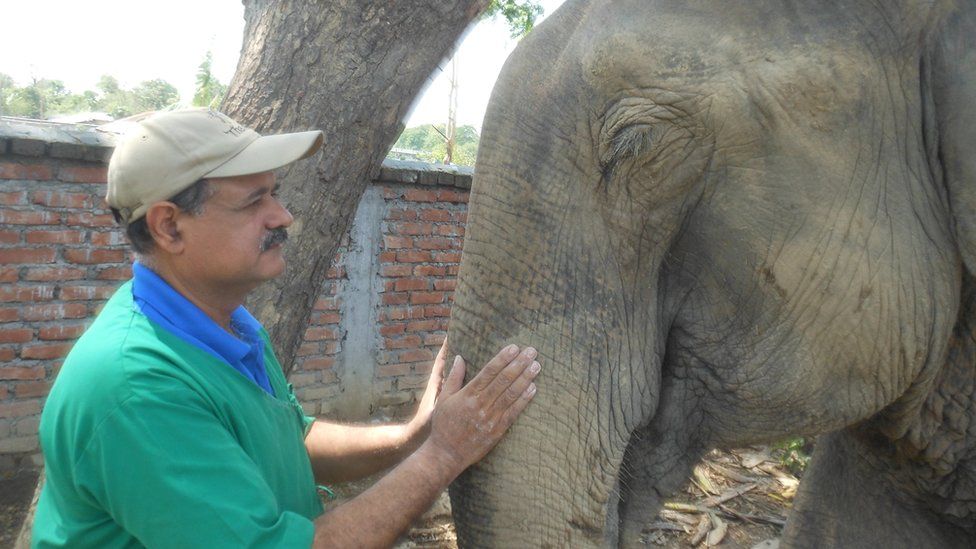The Indian doctor taking care of thousands of elephants
- Published

Kushal Konwar Sarma is affectionately known as the "elephant doctor" in India's wildlife community. He has spent 35 years of his life caring for elephants, saving the lives of thousands of them in the forests of India and Indonesia, writes BBC Hindi's Dilip Kumar Sharma.
"I am the happiest when I am around elephants," says Dr Sarma. "The amount of time I have spent with elephants is more than the time I have spent with my family."
The 60-year-old grew up in a village called Barma in India's north-eastern state of Assam, which is home to around 5,000 of the country's more than 27,000 elephants, according to the last survey conducted in 2017.
He says he has been able to understand the "language" of elephants. "In addition to feeding them, I communicate with them through signs," he says, adding that "now most of the elephants here recognise me".
Dr Sarma was awarded Padma Shri, one of India's highest civilian honours, for his work earlier this year. According to his own estimate, he has treated more than 10,000 elephants so far.
It all began in 1984, when he first treated a sick elephant under the tutelage of his mentor, Professor Subhash Chandra Pathak.
"I remember the first time I went with him to Manas National Park to treat elephants. I was very excited that day," Dr Sarma says.
His connection to elephants can be traced to his childhood, when his family took care of a female elephant called Laxmi in their home. "When I was about seven, I used to sit on Laxmi and go around the village - it's one of my most vivid memories of her. That's how I began to love elephants."
This love and bond with elephants has cemented his career as the go-to doctor in the state, especially during the monsoon season. Assam is particularly prone to heavy flooding, often putting the animals there at risk.
The Kaziranga National Park, a Unesco Heritage Site in the state, is one such area. Most recently, the state was hit by flooding in July and officials said at least 51 animals in the park died.
"Animals suffer greatly during the flooding season in the park. Many animals die and even elephants get washed away," Dr Sarma, who often helps officials with their animal rescue efforts, says. "It's common for baby elephants to get separated from their mothers. In such situations, they need extra care and support. That's why I help out during the floods."
He isn't always officially asked to go and help during the floods. "But I always go because I want to try and save as many animals as possible."
Dr Sarma has covered over 300,000km (186,411 miles) of dense forest in Assam, encountering and treating thousands of elephants. But in addition to his childhood elephant, another one remains close to his heart - Geeta, a female elephant who lives in the Kaziranga National Park.
"Once when I was visiting the US, I got news that someone had shot Geeta while she was in the Kaziranga National Park. Fortunately, none of the five bullets hit any vital organs, but I was very anxious," he recalls, adding that he even considered abandoning his trip to fly back to India.
"But instead, I assisted in Geeta's treatment over the phone," he says. As soon as he returned a week later, he drove straight to the park to meet Geeta.
"I assured her that I would treat her well and that I would extract all the bullets from her body. After locating the bullets with a metal detector, I removed the first three bullets through surgery."
He says the other two were lodged deep inside her body, making it difficult to extract them. "But I continued my treatment and finally after five surgeries, even the last bullet was taken out of her body. My dear Geeta is still alive and very much healthy."
Even though Dr Sarma loves his job, he knows it comes with risks.
He says he's probably risked his life various times as part of the job. "I often wonder, how did I survive?" he muses.
"Once I had to spend the whole night on a tree in order to try and sedate a wild elephant that we were trying to capture for treatment."
But despite the dangers involved, he says the work has been fulfilling. He hopes to inspire his daughter, who has completed a degree in veterinary science, and often helps him with his work.
"I want my daughter to carry forward the responsibility of treating elephants after me."
- Published23 October 2018
- Published7 September 2020
- Published30 January 2020
- Published21 June 2019